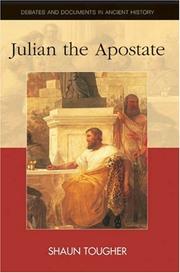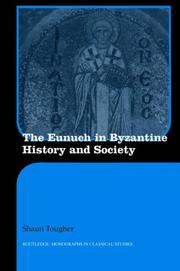| Listing 1 - 10 of 14 | << page >> |
Sort by
|

ISBN: 9780748618873 9780748618866 0748618872 0748618864 1474473288 Year: 2007 Volume: *1 Publisher: Edinburgh : Edinburgh University Press,
Abstract | Keywords | Export | Availability | Bookmark
 Loading...
Loading...Choose an application
- Reference Manager
- EndNote
- RefWorks (Direct export to RefWorks)
This study of the last pagan Roman emperor provides remarkable insight into the man and his timesThe figure of Julian demands the attention of historians. As the last pagan Roman Emperor, he provides a focus for studying the religious transformations that were taking place in the empire in the fourth century. Further, his secular policies and concerns concentrate attention on other transformations – social and political – within the period.Notably, Julian elicited sharply divided opinion from his contemporaries, which is largely polarised between pagan supporters and Christian opponents. Such division of opinion is also matched by the modern literature on him. Was he the prospective saviour of the Roman Empire, or was he out-of-touch and living in the past? Was he an evangelist for Mithraism, or an altogether more traditional pagan? Was he a shrewd military man, or a rash risk-taker whose luck spectacularly ran out on his Persian expedition? These questions and more are asked and discussed, allowing students to reach their own verdict on this exciting and controversial emperor.Key Features:*Issues of historical significance are identified and discussed*Key passages of text are gathered and accessible in one volume*Modern interpretations of Julian are presented and consideredThe figure of Julian demands the attention of historians. As the last pagan Roman Emperor, he provides a focus for studying the religious transformations that were taking place in the empire in the fourth century. Further, his secular policies and concerns concentrate attention on other transformations – social and political – within the period.Notably, Julian elicited sharply divided opinion from his contemporaries, which is largely polarised between pagan supporters and Christian opponents. Such division of opinion is also matched by the modern literature on him. Was he the prospective saviour of the Roman Empire, or was he out-of-touch and living in
Emperors --- Empereurs --- Biography. --- Biographies --- Julian, --- Rome --- Religion. --- History --- Religion --- Histoire --- Paganism --- History. --- 929 JULIANUS APOSTATA --- Civilization, Pagan --- Heathenism --- Religions --- Biografie. Genealogie. Heraldiek--JULIANUS APOSTATA --- Julianus, --- Julianus, Flavius Claudius, --- I︠U︡lian, --- Juliano, --- Yulyanus, Flaṿyus Ḳlaʼudyus, --- Ioulianos, --- Giuliano, --- Julien, --- יוליאנוס, --- Ἰουλιανὸς, --- 929 JULIANUS APOSTATA Biografie. Genealogie. Heraldiek--JULIANUS APOSTATA --- Biography --- Paganism - Rome - History. --- Emperors - Rome - Biography --- Julian, - Emperor of Rome, - 331-363. --- Rome - Religion. --- Rome - History - Julian, 361-363.

ISBN: 9780415425247 0415425247 9780203866207 9781135235666 9781135235703 9781135235710 9780415594790 0415594790 Year: 2008 Publisher: London Routledge
Abstract | Keywords | Export | Availability | Bookmark
 Loading...
Loading...Choose an application
- Reference Manager
- EndNote
- RefWorks (Direct export to RefWorks)
Eunuchs --- Eunuques --- Byzantine Empire --- Empire byzantin --- History --- Histoire --- History. --- Men --- Eunuchs - Byzantine Empire --- Byzantine Empire - History
Book
ISBN: 9781138218680 1138218685 9780429060984 042906098X 9780429592409 042959240X 9780429588525 0429588526 9780429590467 0429590466 Year: 2019 Publisher: London Routledge
Abstract | Keywords | Export | Availability | Bookmark
 Loading...
Loading...Choose an application
- Reference Manager
- EndNote
- RefWorks (Direct export to RefWorks)
The subject of the emperor in the Byzantine world may seem likely to be a well-studied topic but there is no book devoted to the emperor in general covering the span of the Byzantine empire. Of course there are studies on individual emperors, dynasties and aspects of the imperial office/role, but there remains no equivalent to Fergus Millar’s The Emperor in the Roman World (from which the proposed volume takes inspiration for its title and scope). The oddity of a lack of a general study of the Byzantine emperor is compounded by the fact that a series of books devoted to Byzantine empresses was published in the late twentieth and early twenty-first centuries. Thus it is appropriate to turn the spotlight on the emperor.Themes covered by the contributions include: questions of dynasty and imperial families; the imperial court and the emperor’s men; imperial duties and the emperor as ruler; imperial literature (the emperor as subject and author); and the material emperor, including imperial images and spaces.The volume fills a need in the field and the market, and also brings new and cutting-edge approaches to the study of the Byzantine emperor. Although the volume cannot hope to be a comprehensive treatment of the emperor in the Byzantine world it aims to cover a broad chronological and thematic span and to play a vital part in setting the agenda for future work. The subject of the Byzantine emperor has also an obvious relevance for historians working on rulership in other cultures and periods.
Emperors --- Czars (Emperors) --- Rulers --- Sovereigns --- Tsars --- Tzars --- Kings and rulers --- Byzantine Empire --- Byzantium (Empire) --- Vizantii︠a︡ --- Bajo Imperio --- Bizancjum --- Byzantinē Autokratoria --- Vyzantinon Kratos --- Vyzantinē Autokratoria --- Impero bizantino --- Bizantia --- Politics and government --- History --- Conferences - Meetings
Book
ISBN: 9781350188235 1350188239 1350164046 1441174419 1474217184 1847251684 Year: 2022 Publisher: London Bloomsbury Academic
Abstract | Keywords | Export | Availability | Bookmark
 Loading...
Loading...Choose an application
- Reference Manager
- EndNote
- RefWorks (Direct export to RefWorks)
"Eunuchs tend to be associated with eastern courts, popularly perceived as harem personnel. However, the Roman empire was also distinguished by eunuchs-- they existed as slaves, court officials, religious figures and free men. This book is the first to be devoted to the range of Roman eunuchs. Across seven chapters (spanning the third century BC to the sixth century AD), Shaun Tougher examines the history of Roman eunuchs, focusing on key texts and specific individuals. Subjects met include the Galli (the self-castrating devotees of the goddess the Great Mother), Terence's comedy The Eunuch (the earliest surviving Latin text to use the word 'eunuch'), Sporus and Earinus the eunuch favourites of the emperors Nero and Domitian, the 'Ethiopian eunuch' of the Acts of the Apostles (an early convert to Christianity), Favorinus of Arles (a superstar intersex philosopher), the Grand Chamberlain Eutropius (the only eunuch ever to be consul), and Narses the eunuch general who defeated the Ostrogoths and restored Italy to Roman rule. A key theme of the chapters is gender, inescapable when studying castrated males. Ultimately this book is as much about the eunuch in the Roman imagination as it is the reality of the eunuch in the Roman empire."--Back cover.
Eunuchs --- Rome --- Civilization. --- History
Book
ISBN: 9781474473286 Year: 2022 Publisher: Edinburgh
Abstract | Keywords | Export | Availability | Bookmark
 Loading...
Loading...Choose an application
- Reference Manager
- EndNote
- RefWorks (Direct export to RefWorks)
Book
ISBN: 1474459978 1399518518 147445996X Year: 2022 Publisher: Edinburgh, Scotland : Edinburgh University Press,
Abstract | Keywords | Export | Availability | Bookmark
 Loading...
Loading...Choose an application
- Reference Manager
- EndNote
- RefWorks (Direct export to RefWorks)
Considers the ideals and realities of generalship across the Greek, Roman and Byzantine worlds.
Command of troops. --- Military art and science. --- Rome --- History. --- To 500
Book
ISBN: 9781905125500 190512550X Year: 2012 Publisher: Swansea : Classical Press of Wales and Duckworth,
Abstract | Keywords | Export | Availability | Bookmark
 Loading...
Loading...Choose an application
- Reference Manager
- EndNote
- RefWorks (Direct export to RefWorks)
History, Ancient. --- Historiography. --- Literatur --- Kongress --- Julian, --- Criticism and interpretation. --- Rome --- History --- Literatur.
Book
ISBN: 3030398986 3030398978 Year: 2020 Publisher: Cham : Springer International Publishing : Imprint: Palgrave Macmillan,
Abstract | Keywords | Export | Availability | Bookmark
 Loading...
Loading...Choose an application
- Reference Manager
- EndNote
- RefWorks (Direct export to RefWorks)
This edited collection focuses on the Roman empire during the period from AD 337 to 361. During this period the empire was ruled by three brothers: Constantine II (337-340), Constans I (337-350) and Constantius II (337-361). These emperors tend to be cast into shadow by their famous father Constantine, the first Christian Roman emperor (306-337), and their famous cousin Julian, the last pagan Roman emperor (361-363). The traditional concentration on the historically renowned figures of Constantine and Julian is understandable but comes at a significant price: the neglect of the period between the death of Constantine and the reign of Julian and of the rulers who governed the empire in this period. The reigns of the sons of Constantine, especially that of the longest-lived Constantius II, mark a moment of great historical significance. As the heirs of Constantine they became the guardians of his legacy, and they oversaw the nature of the world in which Julian was to grow up. The thirteen contributors to this volume assess their influence on imperial, administrative, cultural, and religious facets of the empire in the fourth century. .
Constantine --- Constantijn, --- Constantin, --- Constantin --- Constantine, --- Constantino --- Constantinus Flavius Valerius Aurelius, --- Constantinus --- Constantinus, --- Costantino --- Costantino, --- Flaviĭ Valeriĭ Avreliĭ Konstantin, --- Flavius Valerius Aurelius Constantinus Augustus, --- Flavius Valerius Aurelius Constantinus, --- Flavius Valerius Constantinus, --- Konstantin, --- Konstantin --- Kōnstantinos, --- Kōnstantinos --- Konstantyn, --- Kostandianos --- Κωνσταντίνος, --- Флавий Валерий Аврелий Константин, --- Константин --- Константин, --- Flavije Valerije Konstantin --- Europe—History—476-1492. --- Civilization—History. --- Social history. --- History of Medieval Europe. --- Cultural History. --- Social History. --- Descriptive sociology --- Social conditions --- Social history --- History --- Sociology --- Civilization --- History. --- Europe
Multi
ISBN: 9783030398989 Year: 2020 Publisher: Cham Springer International Publishing :Imprint: Palgrave Macmillan
Abstract | Keywords | Export | Availability | Bookmark
 Loading...
Loading...Choose an application
- Reference Manager
- EndNote
- RefWorks (Direct export to RefWorks)
This edited collection focuses on the Roman empire during the period from AD 337 to 361. During this period the empire was ruled by three brothers: Constantine II (337-340), Constans I (337-350) and Constantius II (337-361). These emperors tend to be cast into shadow by their famous father Constantine, the first Christian Roman emperor (306-337), and their famous cousin Julian, the last pagan Roman emperor (361-363). The traditional concentration on the historically renowned figures of Constantine and Julian is understandable but comes at a significant price: the neglect of the period between the death of Constantine and the reign of Julian and of the rulers who governed the empire in this period. The reigns of the sons of Constantine, especially that of the longest-lived Constantius II, mark a moment of great historical significance. As the heirs of Constantine they became the guardians of his legacy, and they oversaw the nature of the world in which Julian was to grow up. The thirteen contributors to this volume assess their influence on imperial, administrative, cultural, and religious facets of the empire in the fourth century. .
World history --- History of civilization --- History of Europe --- cultuurgeschiedenis --- geschiedenis --- Europese geschiedenis --- middeleeuwen --- anno 500-1499 --- Europe
Periodical
Publisher: Edinburgh Edinburgh University Press
Abstract | Keywords | Export | Availability | Bookmark
 Loading...
Loading...Choose an application
- Reference Manager
- EndNote
- RefWorks (Direct export to RefWorks)
| Listing 1 - 10 of 14 | << page >> |
Sort by
|

 Search
Search Feedback
Feedback About UniCat
About UniCat  Help
Help News
News